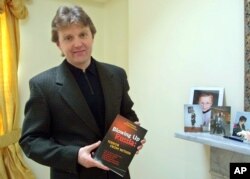A top British government investigator said Thursday that Russian President Vladimir Putin probably personally approved the assassination of Alexander Litvinenko, a Russian spy-turned-dissident who was exiled in Britain after criticizing Putin and accusing him — among other things — of being a pedophile.
Robert Owen, a retired judge serving as the inquiry's chairman, announced that his yearlong inquiry had confirmed the Russian state was responsible for the November 2006 poisoning of Litvinenko, carried out by two Russian agents at the Millennium hotel in central London just a few meters from the U.S. Embassy.
For nearly nine years since her husband's death, Marina Litvinenko has been demanding answers. Thursday brought some vindication for her. Speaking to reporters outside the Royal Courts in London, she said she was "of course very pleased" by the outcome. "The words my husband spoke on his deathbed when he accused Mr. Putin of his murder have been proved true in an English court with a high standard of independence and fairness,”she said.
Polonium-210
Polonium-210
- Highly radioactive
- Toxic if it enters the body by eating, breathing or through a wound
- Occurs naturally and is present in the environment in low concentrations
- Releases a great deal of energy
- Was discovered by Marie Sklodowska-Curie and Pierre Curie in 1898
- Historically called radium F, is very hard for doctors to identify
Source: IAEA
In Moscow, Russian Foreign Ministry spokeswoman Maria Zhakarova said, "We regret that a purely criminal case has been politicized and has darkened the general atmosphere of bilateral relations.''
In Washington, White House spokesman Josh Earnest said the case showed Russia's "willingness to flout basic conventions around human rights and free speech" and that the worrisome "political environment that currently exists in Russia seems to also extend, at least in some occasions, beyond Russia's borders."
He said the White House wouldn't rule out "relevant future steps" to address some of the concerns raised by the findings of the inquiry.
Back story
Litvinenko was an agent of the Russian Federal Security Service, the spy agency that came after the Soviet-era KGB. But after becoming an outspoken critic of Putin in 1998, he fled Russia and sought asylum in Britain.
He continued to anger the Kremlin with criticism of Putin that included personal attacks, such as an article in which he accused the Russian leader of being a pedophile. The Kremlin rejected the accusation.
In early November 2006, Litvinenko agreed to meet with Russian agents Andrei Lugovoi and Dmitry Kovtun, who British officials say laced his tea with radioactive polonium, a substance experts say is made in Russia. Lugovoi and Kovtun returned to Russia.
Litvinenko quickly became ill and died at a hospital 23 days later. Photos of him on his deathbed show him emaciated and having lost his hair. His wife said he asked to be photographed to show "what Putin had done to him."
With radioactive contamination spreading from the hotel to the streets of London, investigators described it as a nuclear attack in the heart of England's capital that put its population at risk.
Widow demands expulsion, sanctions
Litvinenko's widow on Thursday called for all Russian intelligence operatives to be expelled from Britain, and she, like some British lawmakers, said she wanted sanctions imposed against individuals named as culprits in the inquiry.
"I received a letter last night from the home secretary promising action. It is unthinkable that the prime minister would do nothing in the face of damaging findings of Sir Robert Owen," Marina Litvinenko told reporters.
Prime Minister David Cameron's spokeswoman said that he found the findings "extremely disturbing" and that the government was considering what actions to take.
"It is not the way for any state, let alone a permanent member of the U.N. Security Council, to behave," the spokeswoman said. "Regrettably, these findings confirm what we and previous governments believed."
WATCH: British Home Secretary Theresa May reacts to Litvinenko inquiry
Action by Britain unlikely
Britain has strong economic ties to Russia and is eager to recruit Putin’s help in ending the crisis in Syria. Analysts say those factors make it unlikely that leaders here will take any action that will threaten the wider relationship over the killing of one foreign former spy by two others.
London financier Bill Browder, a human rights campaigner and Putin critic, spoke out against what he said was the British government's reluctance to punish the Russian leader for Litvinenko's slaying.
“I can’t get inside the minds of the government officials but I can speculate, and what I would speculate is that it comes down to money. There’s a lot of Russian money sloshing around London, and I believe that there’s a concern among certain members of the government that that money would be less available if Britain took a moral stand on some of these issues,” Browder, the CEO and co-founder of investment fund Hermitage Capital Management, told VOA. "Today’s response, as it stands right now from the British government, is a green light for him [Putin] to carry on doing murders, invasions and other atrocities without any consequences."
One battle has ended for Marina Litvinenko, but another has just begun.
VOA Moscow correspondent Daniel Schearf and Chris Hannas in Washington contributed to this report.

